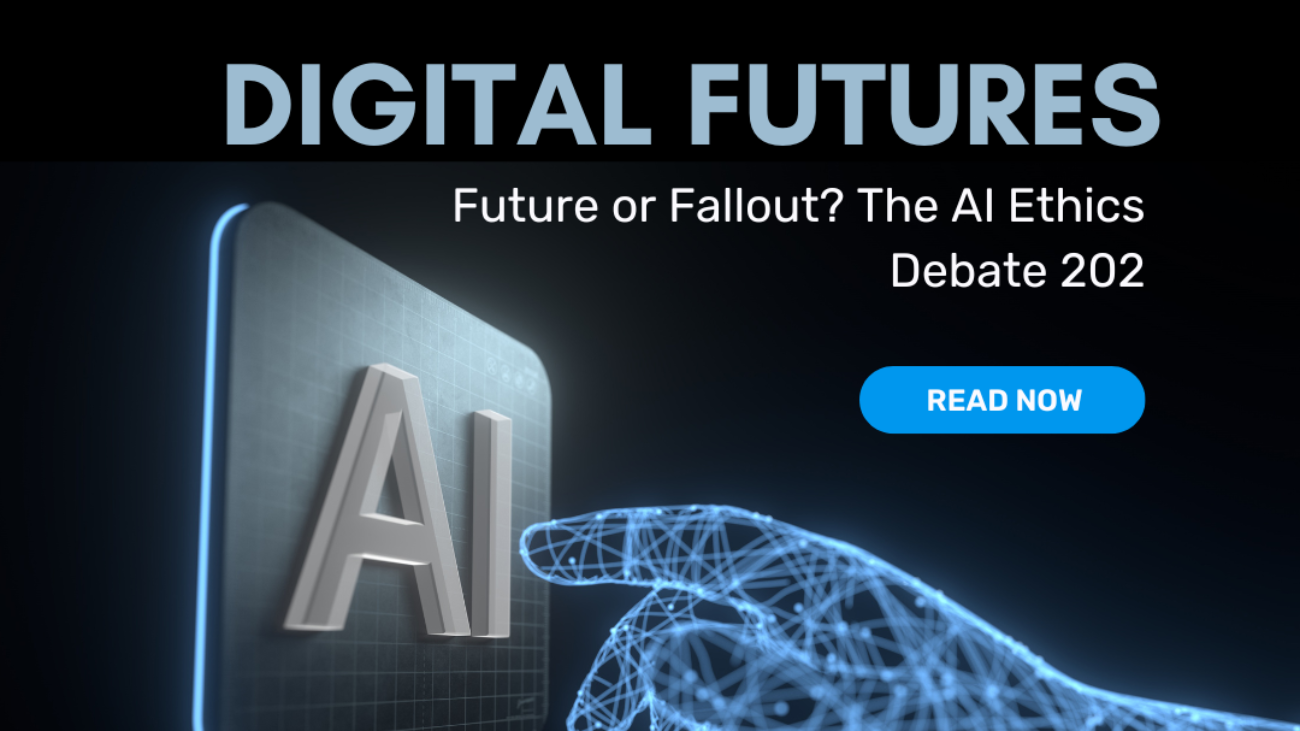Artificial Intelligence (AI) is no longer a concept from science fiction.
Tomorrow with AI

It’s embedded in our everyday lives from voice assistants and recommendation algorithms to autonomous vehicles and predictive analytics. But as machines get smarter, faster, and more autonomous, one question grows louder: how do we ensure AI aligns with human values?
This blog explores the intersection of AI and ethics, shedding light on why ethical AI matters, our challenges, and how society, businesses, and technologists can navigate this evolving digital frontier
The AI Surge
AI systems can now perform tasks once reserved for humans: recognizing faces, interpreting languages, generating content, and making decisions. As they gain influence over aspects of our lives and decision-making, their impact grows both in promise and peril.

Should AI be allowed to make life-changing decisions without human oversight?
For example, AI in healthcare can enhance diagnostics, yet it may also reinforce existing biases if not carefully designed. Similarly, AI-driven hiring platforms may streamline recruitment but could also unintentionally discriminate. The implications are vast and raise crucial ethical questions.
Guardrails for AI
Unlike traditional software, AI systems “learn” from data, which means they can replicate and amplify biases present in that data. Without clear ethical standards, AI can contribute to inequality, misinformation, and even social division.
Moreover, decisions made by AI often lack transparency. Who is responsible when a self-driving car crashes? Or when a loan application is denied by an algorithm? Ethical frameworks are needed not just to prevent harm, but to promote fairness, accountability, and trust in these technologies
AI Dilemmas
- Bias and Fairness AI learns from historical data. If the data contains social or cultural biases, the AI can inherit them. For example, facial recognition systems have shown higher error rates for people of color. Ensuring fairness requires diverse datasets, inclusive design, and continuous auditing.
- Transparency and Explainability. Many AI systems operate as “black boxes,” where decisions are made without understandable logic. Explainable AI (XAI) is crucial to helping users and regulators trust AI by making its decisions interpretable.
- Accountability and Responsibility: When things go wrong, who is liable? The developer, the user, the data provider? As AI becomes more autonomous, clear accountability must be defined.
- Privacy and Surveillance AI-powered surveillance can improve security,y but also threaten individual freedoms. Ethical AI must respect privacy rights and data protection laws.
- Autonomy and Human Oversight While automation offers efficiency, human oversight remains essential. Ethical AI requires a balance between machine autonomy and human control.
Designing Fair AI
- Develop Clear Ethical Guidelines: Organizations should create and adopt AI ethics policies based on core principles like fairness, transparency, accountability, and non-maleficence.
- Involve Diverse Stakeholders: Engineers, ethicists, policymakers, and affected communities should collaborate throughout the AI lifecycle.
- Invest in Explainable AI: Prioritize systems that can explain their logic and outputs in ways humans can understand.
- Conduct Regular Audits: Just like financial systems, AI systems should be audited regularly for bias, accuracy, and unintended consequences.
- Promote AI Literacy: Educating the public about how AI works and what it can and cannot do is critical to informed adoption.
Global Rules, Shared Responsibility

Governments and international bodies are beginning to step in. The EU AI Act, UNESCO’s AI Ethics recommendations, and similar efforts in the U.S., Canada, and Asia highlight the growing recognition of the need for governance.
However, ethical AI is not the responsibility of policymakers alone. It must be a shared commitment between the public, private, and academic sectors.
Conclusion: Aligning AI with Humanity As we entrust machines with more decisions, we must embed ethics at the core of innovation. AI should not only be powerful but also principled. It should reflect the diversity, dignity, and rights of all people.
The future of AI is not just about algorithms—it’s about values. By prioritizing ethical design and inclusive governance, we can harness AI’s power to enhance society while protecting what makes us human.
Created by Zain Malik | Blue Peaks Consulting

 Cart is empty
Cart is empty 
Add a Comment